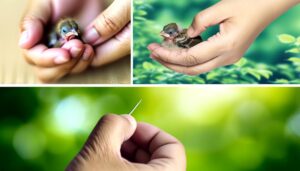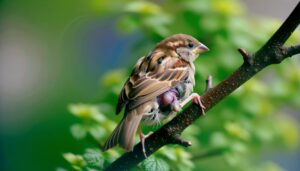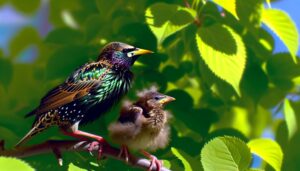Can Baby Sparrows Eat Dog Food Safely?
Feeding dog food to a baby sparrow isn't recommended. Baby sparrows need a diet rich in proteins, fats, and essential amino acids.
Dog food lacks the specific nutrients required for their growth and could lead to malnutrition. High protein and fat content can strain a sparrow's digestive system, and additives might cause toxicity.
Instead, offer insects like mealworms or specialized bird foods which provide the right nutrients. Ensuring proper hydration also plays a role in their development.
For more insights into providing the best care for baby sparrows, there's additional valuable information available.
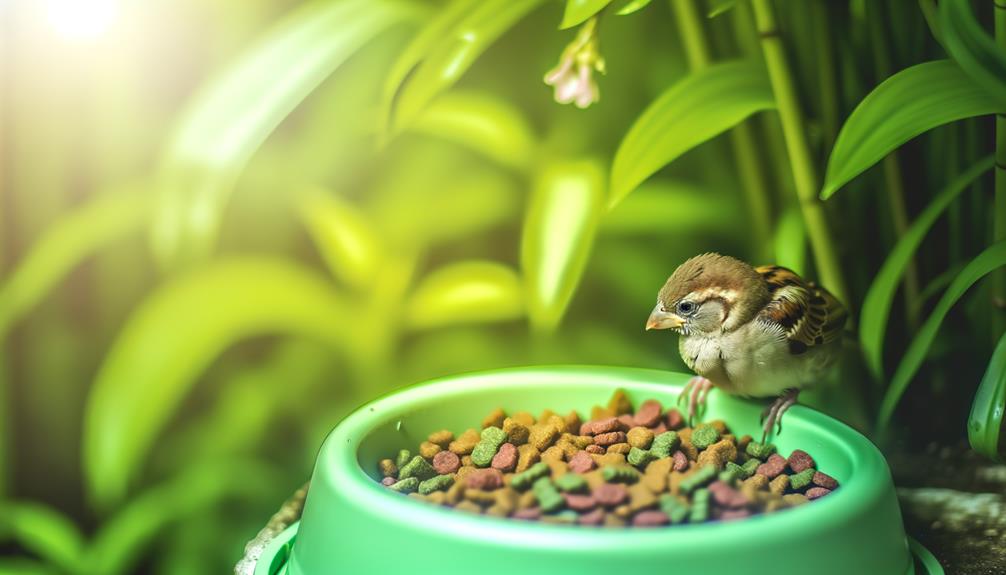
Key Takeaways
- Dog food is not formulated for the nutritional needs of baby sparrows.
- Feeding dog food can lead to nutritional imbalances and deficiencies in baby sparrows.
- Dog food lacks essential amino acids and vitamins critical for sparrow growth.
- High protein and fat content in dog food can strain a sparrow's digestive system.
- Additives in dog food may cause toxic reactions in baby sparrows.
Nutritional Needs of Baby Sparrows
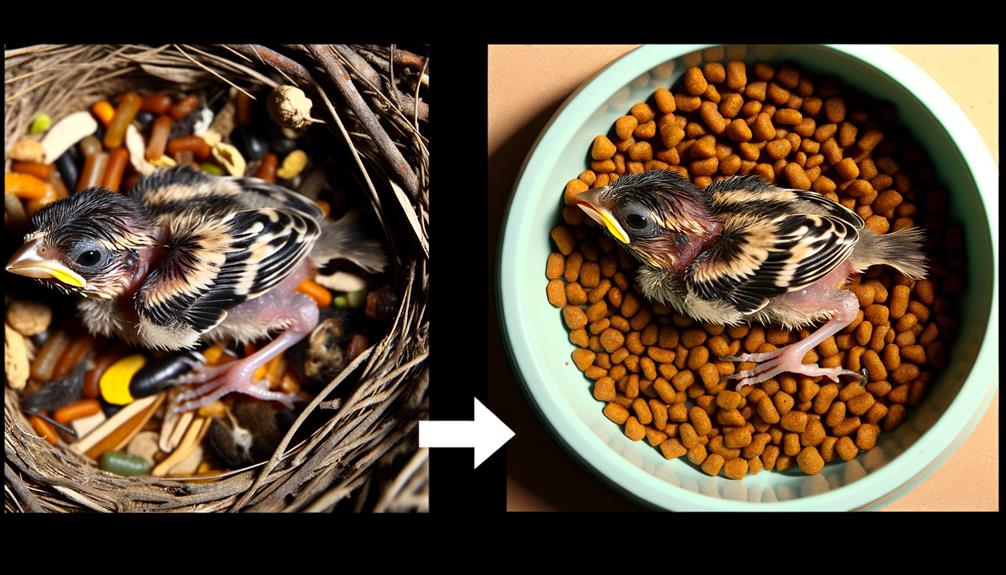
Understanding the nutritional needs of baby sparrows is significant, as these altricial birds require a diet rich in proteins, fats, and essential amino acids for optimal growth and development.
You should know that their rapid growth phase demands high-quality proteins to support muscle formation and feather development. Fats provide a concentrated energy source, essential for their high metabolic rate. Essential amino acids, which they can't synthesize, must be obtained from their diet to guarantee proper physiological functions.
Monitoring their intake is crucial, as deficiencies can lead to stunted growth or weakened immune systems. By focusing on their specific nutritional needs, you'll help these delicate creatures thrive during their formative stages, ensuring they grow into healthy, strong adult sparrows.
Common Foods for Baby Sparrows
Given their demanding nutritional requirements, baby sparrows typically consume a variety of foods rich in proteins and fats, including insects, small invertebrates, and specially formulated bird food. You'll find that mealworms, crickets, and fly larvae are particularly beneficial, as they provide essential amino acids and fatty acids necessary for growth.
Additionally, these young birds benefit from finely ground bird seed mixes that include millet, sunflower hearts, and oat groats, which are easier to digest. Formulated hand-rearing food, designed specifically for passerines, ensures that they receive balanced nutrients.
Hydration is essential, so always provide clean, fresh water. By focusing on these species-specific dietary needs, you'll help baby sparrows thrive and develop into healthy adults, fulfilling your goal of serving them well.
Dog Food Ingredients
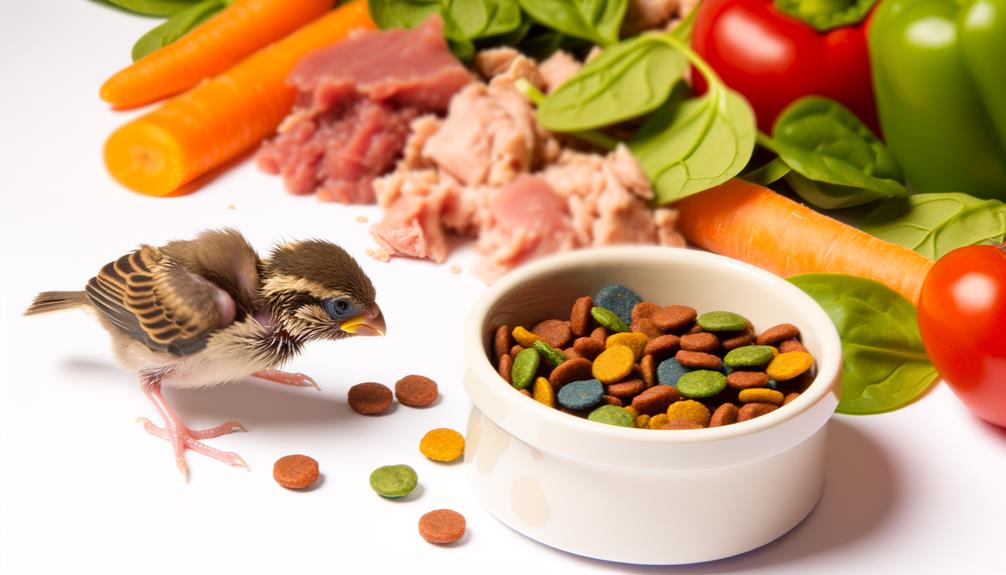
Dog food typically contains a blend of meat, grains, vegetables, and added vitamins and minerals, formulated to meet the nutritional needs of canines.
You'll find proteins sourced from chicken, beef, or fish, which provide essential amino acids for muscle growth and repair. Grains like rice and corn offer carbohydrates for energy.
Vegetables such as carrots and peas add fiber, aiding digestion. Additionally, dog food includes vitamins A, D, and E, and minerals like calcium and phosphorus to support bone health and metabolic functions.
When considering the dietary needs of sparrows, it's important to mention that these ingredients are specifically balanced for dogs.
The protein levels, fat content, and micronutrients in dog food are tailored to canine physiology, not avian requirements.
Dog Food Vs. Bird Food
When comparing dog food to bird food, it's crucial to recognize that bird food is specifically formulated to meet the unique dietary requirements of avian species, including appropriate levels of protein, fat, and essential micronutrients.
Birds, such as sparrows, require a diet rich in seeds, fruits, and insects, ensuring they receive essential components like amino acids, vitamins A and E, and calcium.
Dog food, on the other hand, is designed for canines, containing ingredients like meat byproducts, grains, and specific fat sources tailored to a dog's metabolism and energy needs.
While dog food might contain some overlapping nutrients, it's not optimized for avian physiology, potentially leading to deficiencies or imbalances in a bird's diet.
Safety Concerns
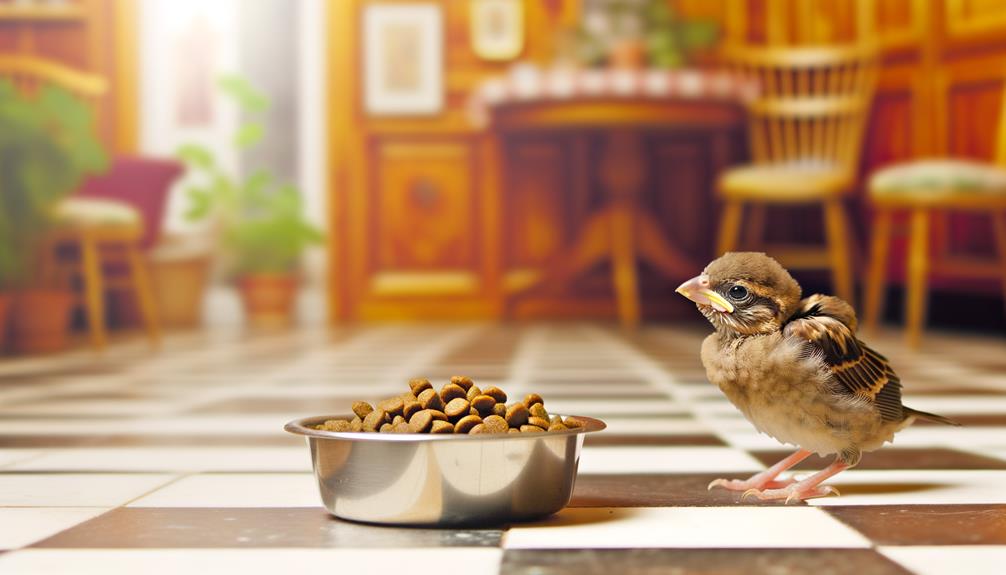
Feeding a baby sparrow dog food raises significant safety concerns, including the risk of nutritional imbalances and potential toxicity. Dog food formulations are designed specifically for canine dietary requirements, which differ markedly from avian needs.
High protein and fat content in dog food can strain a sparrow's delicate digestive system, leading to malabsorption and gastrointestinal distress. Additionally, additives such as preservatives and artificial colors may cause toxic reactions in young sparrows.
Moreover, the absence of essential nutrients like calcium and specific amino acids vital for avian development can result in skeletal deformities and impaired growth. Prioritizing the health and well-being of the baby sparrow necessitates a diet that mirrors its natural nutritional profile, reducing risks associated with inappropriate food sources.
Preparation Tips
Given the potential dangers of dog food, you should prepare an alternative, species-appropriate diet to guarantee the baby sparrow receives peak nutrition. Focus on creating a balanced mix of proteins, fats, and vitamins required for best growth and development.
Consider the following essential components:
- Insect Protein: Crushed mealworms or crickets offer high-quality protein essential for muscle development.
- Soft Fruits: Mashed berries provide essential vitamins and antioxidants, supporting overall health.
- Hard-Boiled Egg Yolk: Rich in nutrients, it's an excellent source of protein and fat, aiding in rapid growth.
- Calcium Supplement: Powdered eggshells or a commercial avian calcium supplement ensures proper bone development.
Optimize the food is finely mashed and delivered via a small feeding syringe to mimic the natural feeding process.
Alternative Emergency Foods
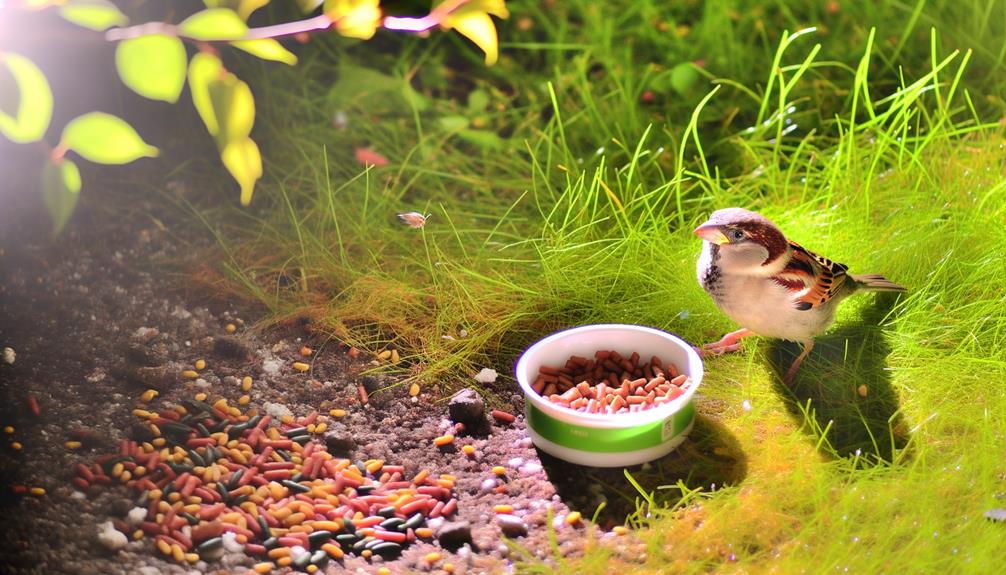
In situations where a species-specific diet isn't immediately available, you can provide emergency nutrition to a baby sparrow using ingredients such as soaked cat kibble or finely mashed boiled vegetables. These alternatives offer essential nutrients while ensuring the bird's immediate survival.
| Ingredient | Preparation Method | Nutritional Benefit |
|---|---|---|
| Soaked Cat Kibble | Soak in water until soft | Protein, fats |
| Boiled Vegetables | Mash finely | Vitamins, minerals |
| Hard-Boiled Egg Yolk | Crumble | Protein, essential fats |
| Baby Cereal (iron-fortified) | Mix with warm water | Carbohydrates, iron |
Ensure you monitor the sparrow's response to these foods and adjust as necessary to maintain its well-being. Always aim to return to a species-specific diet as soon as feasible.
Expert Opinions
You might wonder if dog food can meet the nutritional needs of a juvenile Passer domesticus.
Ornithologists highlight that while dog food contains proteins and fats, it often lacks essential nutrients like calcium and specific amino acids critical for avian growth.
Experts recommend species-specific diets, emphasizing the potential health risks of improper nutrition, such as metabolic bone disease or feather abnormalities.
Nutritional Value Comparison
Experts emphasize the distinct nutritional requirements of baby sparrows, highlighting that dog food lacks the precise protein, fat, and micronutrient balance essential for their growth and development.
You'll find that baby sparrows need a diet rich in specific nutrients to thrive. Here are key components missing in dog food:
- High-Protein Insect Matter: Important for muscle and feather development.
- Essential Fatty Acids: Essential for brain function and energy.
- Calcium and Phosphorus: Necessary for bone strength and structural integrity.
- Vitamins and Trace Minerals: Key for immune system health and overall vitality.
Potential Health Risks
Feeding baby sparrows dog food poses significant health risks, including potential malnutrition and developmental delays due to inadequate nutrient profiles. Experts highlight that dog food is not formulated to meet the specific dietary needs of Passer domesticus. The high protein levels and lack of essential vitamins can lead to serious health issues.
| Health Risk | Observation |
|---|---|
| Malnutrition | Imbalanced nutrient intake can stunt growth. |
| Developmental Delays | Insufficient vitamins may impair physical development. |
| Digestive Problems | High protein can be hard on a sparrow's digestion. |
| Feather Issues | Lack of specific nutrients can affect feather quality. |
| Immune Function | Poor diet weakens the immune system. |
Expert Feeding Recommendations
Veterinarians and avian specialists recommend a diet specifically tailored for baby sparrows, emphasizing the importance of insect protein and nutrient-rich food to guarantee proper growth and development. You should provide an array of foods that mimic their natural diet in the wild.
These experts highlight several key food items:
- Insect larvae: High in protein, essential for muscle development.
- Soft fruits: Provide vitamins and hydration.
- Moistened cat kibble: Rich in protein and easily digestible.
- Egg yolk: Packed with nutrients and essential fats.
Conclusion
While dog food might seem like an emergency solution for feeding baby sparrows, it doesn't meet their specific nutritional needs. Sparrows require a high-protein, insect-based diet, which dog food lacks. Using dog food could lead to malnutrition or health issues.
Always prioritize species-specific diets for best growth and health. If you're in a pinch, consider alternatives like soaked cat kibble or mealworms until you can provide proper bird food. Consult avian experts for the most suitable feeding practices.

